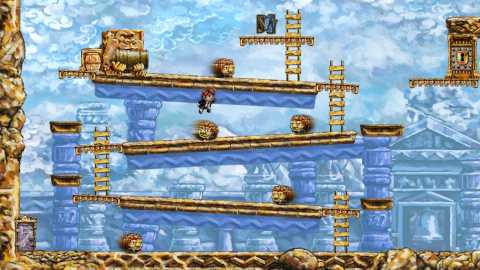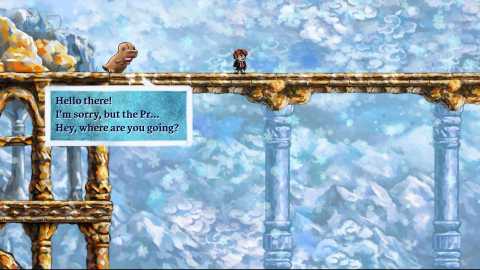
Tim is a heartbroken young man in a suit and tie who must traverse a series of worlds, each with its own set of rules about how time works, in his search for the Princess. His journey is paralleled by memories of a past relationship that went from sweet to sour, but the correlation between the two threads remains ambiguous until the last, revelatory level. There's a navel-gazing quality to the writing that can make it intermittently insufferable. There's also some genuine insight about the often counterintuitive arc of a romantic relationship, and the story compliments the nature of the gameplay nicely.
The game's oddly confessional story makes it easy to shuffle into the indie game name game, but what makes Braid exceptional is that it integrates so elegantly into some really clever game design. There are only two types of enemies, a beige head on legs that bears no actionable similarities to a Goomba, and a pink bunny that pops out of the ground and screeches like a cat. There's no penalty for death, and you could run through the game's five worlds in a few minutes if you cared to. If you did, though, you'd be missing the point, as your real objective is to collect puzzle pieces that have been tucked away behind locked doors and in seemingly unreachable corners of the world.

As such, Braid can be insanely frustrating, but this seems to be by design. The game is filled with red-herrings and double red-herrings. Each world is just long enough that, by the time you've trained your logic muscles to play by a specific, peculiar set of rules, you're off to the next world, where the rules have been changed completely. This constant re-education can leave you feeling punch-drunk. The solutions can take a long, long time to reveal themselves to you, but you feel like the smartest person in the world right after you finish a particularly head-wringing puzzle. Alternately, you may also find yourself giving your TV the finger.
There are some oblique post-end-game challenges to seek out once you've finished Braid, but for the most part, once you've cracked the code and solved all the puzzles, there's not much reason to revisit it. As such, the recent release of Braid on the PlayStation Network doesn't have a lot to offer players who've already been on this adventure, since it's indistinguishable from Braid's Xbox Live Arcade release. If you've not played Braid before, though, everything about it--from the crisp, painterly artwork to the brain-cramping puzzles--still holds up rather brilliantly more than a year later.
I was initially pretty skeptical about Braid, and it took me some time to get past the game's severe melancholy. I eventually found the game's story and the way it plays against the gameplay to be academically interesting, and the game's final payoff is terrific, but it's the ingenuity of the mechanics that makes Braid so engaging.